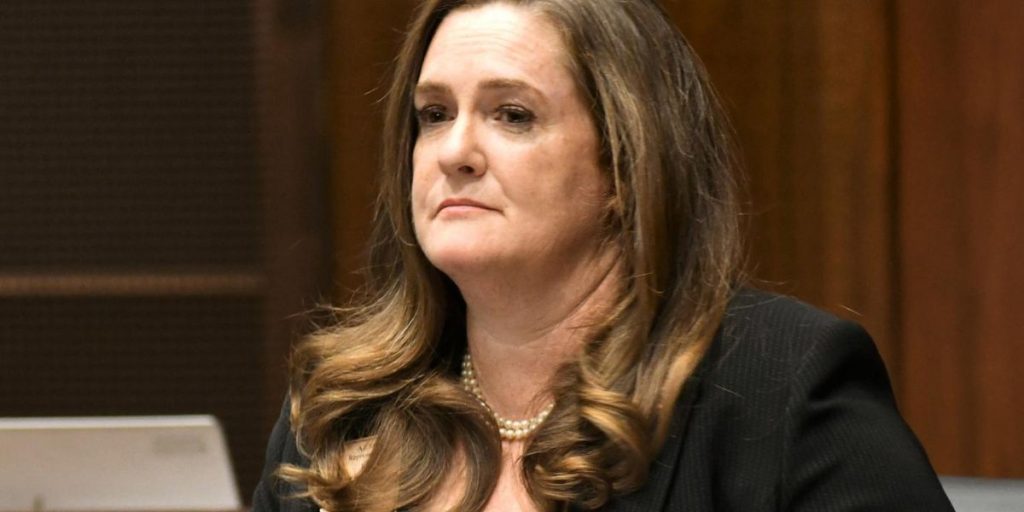Julie Willoughby believes that state legislators should not make legislation while under the influence of narcotics, just as they should not drive.
She claims they make poor decisions.
So, Chandler’s first-term Republican representative has submitted a proposal requiring all members of the Legislature to submit to random drug testing at the discretion of the Senate president or House speaker. And this would apply whenever lawmakers are in session.
“A drug has the power of inhibiting your reasoning ability, making you paranoid, seeing things that aren’t there, and causing you to hallucinate,” Willoughby told Capitol Media Services. “And that could be severe when you consider the job that we do in terms of enacting new laws and defending various issues.”
Consider driving intoxicated, she urged.
“You see someone who is no longer able to respond to things in the appropriate time,” Willoughby added.
Willoughby’s bill prohibits lawmakers from being tested for blood alcohol concentration to see whether they drank too many drinks at lunch before voting. She argued that the technology involved justified the exemption.
“To test alcohol without a breathalyzer, you need a blood draw, which would take a lot more effort to obtain the sample than a urine blood screen,” Willoughby added.
The key, she explained, is to look for non-prescription medicines in the legislator’s system.
That, however, does not account for marijuana, which, following a 2020 public vote, now has the same legal status as alcohol. While there are limits on how much a person can possess at any given moment, there is nothing illegal about utilizing the drug, whether for self-medication or recreational purposes.
However, Willoughby believes it should also be tested for in random drug tests.

“Though it’s a legal drug, it’s not legal to use all the time,” she explained, referring to someone who may be working as a healthcare practitioner. “That would sort of be the same umbrella in my thought process for this drug.”
Nonetheless, this raises a variety of issues.
The marijuana test looks for metabolites, which are molecules left behind when drugs break down in the body. They can also linger long after the psychoactive components’ effects have worn off.
The Arizona Supreme Court has determined that the mere existence of metabolites is inadequate to support a drunk driving conviction. Instead, they ruled that a prosecutor must prove they were impaired.
Willoughby said she doesn’t see this as a problem.
“The bill expands the ability to conduct drug testing,” she said. “It doesn’t specify what happens after a positive drug screen.”
Instead, the results would be sent to the Ethics Committee, which would evaluate whether or not the legislator was engaging in improper conduct.
Willoughby stated that the same principle would apply to someone who tests positive for prescribed medicine, regardless of whether it impairs judgment: the Ethics Committee would make the decision.
The drug test results would only be made public after the Ethics Committee analyzed them and agreed to force the lawmaker to reply. Willoughby explained that this is the point at which everyone would be aware of the outcomes.
And what about “probable cause,” having a reason to test someone?
“That’s a fair question,” Willoughby responded. In fact, she said that allowing the Senate president or House speaker to choose who to test means it might be “weaponized against someone you don’t like.”
However, Willoughby stated that she is counting on the discretion of those leaders to use the power only when they perceive someone acting “abnormally,” possibly even in a “uninhibited” manner.
Sen. John Kavanagh, a Fountain Hills Republican who has been in the Legislature since 2007, was perplexed by the topic of what kind of aberrant behavior would warrant a drug test.
“Many of our legislators are capable of coming up with bizarre bills without the use of drugs,” he stated. Kavanagh does not feel drug testing is required, especially since the legislation exempts alcohol.
“I can’t remember any lawmaker being suspected of doing drugs in my entire time there,” he claimed.
“There may have been a few isolated cases of alcohol intoxication on the night the budget was completed,” Kavanagh stated. “But there is no history of such abuse.”
That is also the view of former House Speaker Rusty Bowers, whose political career dates back to 1997. He stated that at the time, he had not seen anyone who appeared to be on narcotics.
“But I knew some were clearly under the influence of alcohol,” he explained.
Even if a politician is under the influence of drugs, Bowers dismisses the idea that he or she will cause significant harm to the democratic and deliberative processes. Consider the fact that it takes 31 votes to pass a proposal through the House.
“I don’t think, unless they got 30 plus one all toking at once, that it would have any wave of influence,” he joked.
Sen. Lela Alston, whose employment at the Capitol dates back to 1977, likewise questioned the need for this type of legislation, claiming she has never witnessed an issue among her fellow Democrats.
“Now, perhaps Ms. Willoughby and her caucus are concerned about their members,” Alston remarked. “But I see no need for that at all.”
It’s uncertain how far congressional leadership is willing to let her go with the legislation.
House Speaker Ben Toma, who would have the authority to order random drug testing under her measure, has yet to refer it to a committee for a hearing.
Willoughby conceded that her bill might not be quite ready for prime time. However, Willoughby stated that by introducing and pursuing it, she is maintaining her pledge to people who initially raised the issue of drug-impaired lawmakers with her, inspiring her to create the legislation.